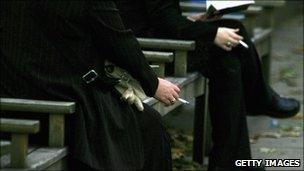Scotland's smoking ban hailed as anniversary approaches
- Published

Statistics from 2009 show that 24.3% of Scots smoke, down from 26.7% before the ban came in
Experts have hailed Scotland's ban on smoking in public places as a "big public health success story", as its five-year anniversary approaches.
One study has suggested a fall in hospital admissions for asthma in children since the ban came into force on 26 March 2006.
But nearly 25% of Scots still smoke.
And the Scottish Licensed Trade Association said the law change had resulted in the closure of hundreds of pubs and the loss of thousands of jobs.
Its chief executive, Paul Waterson, said the predicted upturn in new customers attracted by smoke-free pubs had "simply not materialised".
He conceded other factors - such as the economic downturn and low supermarket prices for alcohol - would have been a factor in the 800 Scottish pub closures.
But he added: "The starting point for all of this is around the time of the smoking ban."
He said the fifth anniversary should be the time for a rethink of the ban and called for the legislation to be changed to allow some pubs to have smoking rooms, to encourage customers back.
"We certainly don't want to go back to the days of smoke-filled pubs but I think after five years it's worth looking at alternatives," he said.
"With the fall-off in pubs, more and more people are drinking at home.
"We may have shifted away from the smoking health problems into health problems associated with drinking at home - and the controlled environment of pubs are the solution to some of the problem."
However, health experts said any softening of the law would be a "backwards step".
Sally Haw, senior scientific adviser for the Scottish Collaboration for Public Health and Policy, said: "The ban really has been one of Scotland's big public health success stories.
"This bold step has really paid off."
Ms Haw cited a study by Glasgow University, external which showed a 15% reduction in the number of children with asthma being admitted to hospital in the three years after the ban came into force.
And she said there had been no evidence people were smoking more at home because they could not do so in enclosed public places.
"There have been benefits for smokers too," she said.
"Smoking prevalence rates have gone down and the respiratory symptoms in smokers post-ban have improved.
"We also found there was an increase in smoking restrictions in the home."
She said this may be explained by a "socio-cultural change" reducing the acceptability of smoking in front of other people.
While the latest figures, from 2009, showed there has been a 2.4% drop in the proportion of smokers in Scotland since the ban came in, the rate in deprived areas remains high, at 41%.
Sheila Duffy, the chief executive of anti-smoking group Ash Scotland, said: "Smoking rates in some of our poorer communities is as high as they were in Scotland in the 1970s.
"So there's a real concern to change the culture in those communities."
She dismissed the idea of introducing well-ventilated smoking rooms in pubs as "thoroughly discredited".
But Simon Clark, director of the pro-smoking group Forest, said: "Other European countries have found a sensible compromise, ranging from licensed smoking premises to exemptions for small or drink-only bars. Why not Scotland?
"At the very least the regulations on outdoor smoking shelters should be relaxed so people can smoke outside in a warm and comfortable environment all year round."
- Published28 January 2011
- Published20 January 2011
- Published10 November 2010
- Published25 January 2011